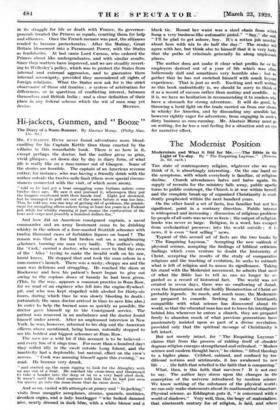Hijackers, Gunmen, and " Booze"
Mn. CUTCLIFFE HYNE never found adventures more blood- curdling for his Captain► Kettle than those enacted by the villains in this remarkable book. There is no hero in it,
except perhaps the doctor, but the author gives us grim, vivid glimpses, set down day by day in diary form, of what life is really like on a rum-runner out of Glasgow. Some of the stories are horrible. The captain of an American revenue cutter, for instance, who was having a friendly drink with the author outside the twelve-mile limit (there were special circum- stances connected with the visit, of which more anon),
" told us he had got a boat smuggling some Italians ashore some twelve days ago. He saw it and pursued it, whereupon they put the beggars overboard with their hands tied. Eight got drowned, but he managed to pull six out of the water before it was too late. This, he told me, was one way of getting rid of evidence, the punish- ment for smuggling aliens ashore being at least ten years in a Federal jail, while for whisky running it just means the confiscation of the boat and cargo and possibly a hundred dollars fine."
And how did an American coastguard captain, a naval
commander and an army lieutenant come to be drinking whisky in the saloon of a four-masted Scottish schooner with twelve thousand cases of forbidden liquors on board ? The reason was that a fire had broken out on a neighbouring ochobner, burning one man very badly. The author's ship, the ' Cask,' carried a doctor, who went over to find the crew
of the Alice ' trying to make the invalid walk on his raw, burnt knees. He stopped that and took the man ashore in a rum-runner's launch. There was a nasty, choppy sea and the man was delirious and struggling. He reached the shore at Rockaway and here his patient's heart began to give out owing to the copious doses of brandy he had been given. (This, by the way, appears a common practice in Rum Row, for we read of an engineer who fell into the engine-flywheel- pit, and who was kept stupefied with alcohol for thirty-six hours, during which time he was slowly bleeding to death : fortunately the same doctor arrived in time to save him also.) In order to help the burned man as quickly as possible, the doctor gave himself up to the Coastguard service. The patient was removed in an ambulance and the doctor found himself under arrest. After an unpleasant interview in New York, he was, however, returned to his ship and the American officers above mentioned, being human, naturally stopped to see the boldest and biggest schooner at Rum Row.
The men are a wild lot if this account is to be believed- . and every line of it rings true. For more than &hundred days they rolled idly in the swell outside Long Island, and the ;inactivity had a deplorable, but natural, effect on the crew's ; nerves. Cook was amusing himself again this evening," we read. He became very drunk,
" and started up the main rigging to look for the Almighty with an axe out of a boat. He reached the cross-trees and threatened 'to take a header into the deep or on to a very hard steel deck. It wasn't until the chief engineer told him that he had just seen - his quarry go into the mess-room that he came down."
And so on, varied with attempts at piracy and " hi-jacking," visits from smuggler aeroplanes, storms, quarrels, mutinies, drunken orgies, and lady- bootlegger " who looked damned nice, neatly dressed in dark bine, with a white blouse and a black tie. Round her waist was a steel chain from which hung a very business-like automatic pistol." " Say," she said " I'll be glad to get ashore, boy. It's a rotten job muckid about here with nix to do half the day." The reader will agree with her, but think also to himself that it is very lucky that the paths of criminals generally lie along unpleasant places.
The author does not make it clear what profits he or his employers derived out of a year of life which was often ludicrously dull and sometimes very horrible also ; but we gather that he has not enriched himself with much beyond experience. That is just as well. Exciting and well written as this book undoubtedly is, we should be sorry to think of it as a record of success rather than mutiny and muddle. As it is, we have no hesitation in recommending it to readers who have a stomach for strong adventure. It will do good, by throwing a lurid light on the trade carried on from our shores in whisky for America, and by dissuading any sensible lad, however rightly eager for adventure, from engaging in such a dirty business as rum-running. Mr. Alastair Moray must go on writing, for he has a real feeling for a situation and an eye for narrative effect.
















































 Previous page
Previous page